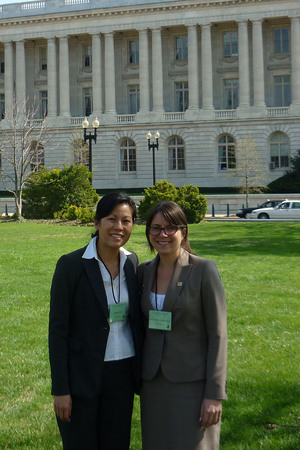
By Andrew Cohen
It was billed by the American Immigration Lawyers Association (AILA) as its “National Day of Action.” But as Linda Tam ’00 and Jackie Shull-Gonzalez ’09 learned during meetings with California legislators in Washington, D.C., action will be hard to come by when it comes to immigration reform.
More than 200 lawyers from across the country recently descended on Washington in an effort to convince their area politicians that immigrants and immigrant-owned businesses drive economic growth and still protect American workers. But Tam and Shull-Gonzalez heard little that indicated any movement beyond enforcement-only proposals.
“It became clear early on that immigration reform is going to be a very difficult issue,” said Tam, a staff attorney and clinical instructor at Berkeley Law’s East Bay Community Law Center. “One of the legislative aides we spoke with called it ‘toxic,’ and another labeled it as today’s most divisive political issue.”
Tam and Shull-Gonzalez received public interest nonprofit attorney scholarships from AILA, a national association of more than 11,000 attorneys who practice and teach immigration law, to represent Northern California at the National Day of Action. Tam assists people living with HIV/AIDS and families of patients at Children’s Hospital in Oakland with immigration matters. Shull-Gonzalez works at Dolores Street Community Services in San Francisco, where she focuses on deportation defense for individuals facing imminent removal.
“The perspective I brought was based on my work with families being separated by current policies,” Shull-Gonzalez said. “One example is the backlog in available family visas, and the impact of that on my clients now facing deportation. One of them was admitted to UC Berkeley but couldn’t enroll.”
Collectively, they met with Congresswoman Zoe Lofgren and staffers of Senator Barbara Boxer and Representatives Nancy Pelosi, Lynn Woolsey, Mike Thompson, Sam Farr, John Garamendi, Dan Lungren, and Wally Herger. Whether in Republican or Democrat offices, the refrain did not change.
“The only kind of reform they foresee is through administrative relief, which the Obama administration seems reluctant to do,” said Shull-Gonzalez. “Beyond not getting traction on the measures we advocated for, new measures are being pushed forward that would further separate immigrant families and make our work more challenging.”
Such measures include the Clear Law Enforcement for Criminal Alien Removal (CLEAR) Act and E-Verify. The CLEAR Act seeks to give states and localities authority to enforce immigration law, and to assist local law enforcement in detecting, arresting, and detaining illegal aliens. It would authorize the federal government to reimburse such states and localities for up to $400 million per year for those activities.
E-Verify is an Internet-based system operated by the Department of Homeland Security. It allows businesses to determine eligibility to work in the United States by comparing information from a job candidate’s employment eligibility verification form to data from U.S. government records. Although E-Verify is voluntary and limited to determining the eligibility of new hires, some California legislators are pushing to mandate its use. Critics assert that the program is inaccurate, with a reported error rate of around 8 percent.
AILA’s reform framework calls on the U.S. government to:
• require all undocumented immigrants to register with the government and earn permanent legal status by paying stiff fines and back taxes, undergoing rigorous background checks, and learning English;
• provide fair, lawful ways for American businesses to hire immigrant workers while protecting U.S. workers from unfair competition and all from exploitation;
• reduce the backlogs in family-based and employment-based immigration;
• ensure that the immigration system provides adequate visas to meet the future needs of American families, businesses and communities; and
• preserve the principles of due process and equal protection while protecting national security.
“I thought there’d be more of a consensus that something needed to be done because the system is broken,” Tam said. “But when you hear that the fight over immigration reform would be worse than the fight over health care reform, that’s a strong indication of just how tough it’ll be to make meaningful progress.”